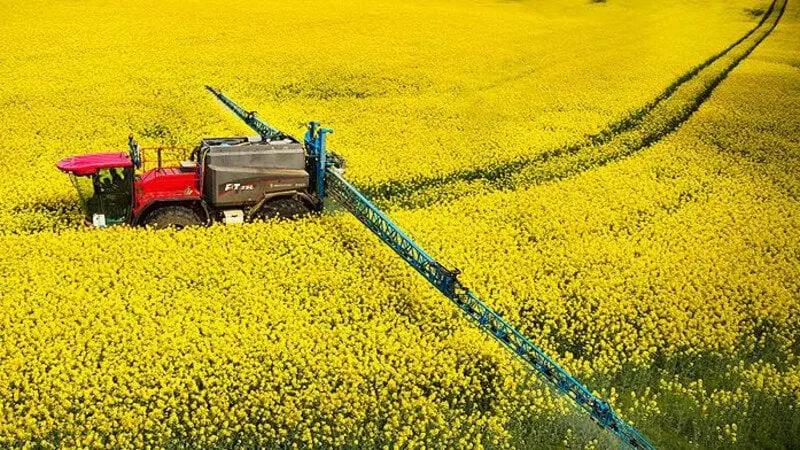Neonicotinoid insecticide ban, poor weather cut EU canola harvest area to 13-year low, USDA finds
Neonicotinoid insecticide ban, poor weather cut EU canola harvest area to 13-year low, USDA finds


Rapeseed production in the European Union (EU27 + UK) for 2020/21 is forecast at 17.0 million metric tons (mmt), 0.2 mmt above last year, but 16 percent below the 5-year average. Harvested area is estimated at 5.5 million hectares, 0.1 million hectares (mha) or 2 percent below last year’s area, and 16 percent below the 5-year average. Yield is forecast at 3.12 tons per hectare, up 3 percent from last year, but similar to the 5-year average.
Harvested area is estimated to be the lowest since 2006/07. Poor weather conditions and the continued ban of neonicotinoids have negatively affected rapeseed area. Extremely wet planting conditions last autumn in the UK, France and other northwestern EU countries delayed or prevented rapeseed planting, a crop that has a very narrow planting window from late August through early September.
Excessive rainfall swamped especially hard-hit UK, where sown area is the lowest since 1989/90. Rapeseed is likely to be replaced by spring barley in the UK. In France, the largest rapeseed producer in Europe, heavy rains have limited area to the lowest since 2003/04. Planting was also challenging in other areas of Europe, with dryness concerns during autumn in Poland, Czech Republic,and Bulgaria. Winter throughout Europe was very mild with a few reports in March of possible scattered frost damage. The current yield concerns center around dryness in central Europe.
In addition to weather variables affecting rapeseed, many EU farmers are also seeing the profitability balance shift towards planting less rapeseed. Generally, market prices have not overcome the lower yields resulting from neonicotinoid restrictions.
Read the original post

 | Videos | More... |

Video: Nuclear energy will destroy us? Global warming is an existential threat? Chemicals are massacring bees? Donate to the Green Industrial Complex!
 | Bees & Pollinators | More... |

GLP podcast: Science journalism is a mess. Here’s how to fix it

Mosquito massacre: Can we safely tackle malaria with a CRISPR gene drive?

Are we facing an ‘Insect Apocalypse’ caused by ‘intensive, industrial’ farming and agricultural chemicals? The media say yes; Science says ‘no’
 | Infographics | More... |

Infographic: Global regulatory and health research agencies on whether glyphosate causes cancer
 | GMO FAQs | More... |

Why is there controversy over GMO foods but not GMO drugs?

How are GMOs labeled around the world?

How does genetic engineering differ from conventional breeding?
 | GLP Profiles | More... |

Alex Jones: Right-wing conspiracy theorist stokes fear of GMOs, pesticides to sell ‘health supplements’




 California, Washington, Oregon forge immunization alliance to safeguard vaccine access against federal undermining
California, Washington, Oregon forge immunization alliance to safeguard vaccine access against federal undermining Trust issues: What happens when therapists use ChatGPT?
Trust issues: What happens when therapists use ChatGPT? Fighting deforestation with CO2: Biotechnology breakthrough creates sustainable palm oil alternative for cosmetics
Fighting deforestation with CO2: Biotechnology breakthrough creates sustainable palm oil alternative for cosmetics Viewpoint — Fact checking MAHA mythmakers: How wellness influencers and RFK, Jr. undermine American science and health
Viewpoint — Fact checking MAHA mythmakers: How wellness influencers and RFK, Jr. undermine American science and health 30-year-old tomato line shows genetic resistance to devastating virus
30-year-old tomato line shows genetic resistance to devastating virus Viewpoint: Video — Big Solar is gobbling up productive agricultural land and hurting farmers yet providing little energy or sustainabilty gains
Viewpoint: Video — Big Solar is gobbling up productive agricultural land and hurting farmers yet providing little energy or sustainabilty gains The free-range chicken dilemma: Better for birds, but with substantial costs
The free-range chicken dilemma: Better for birds, but with substantial costs ‘You have to treat the brain first’:Rethinking chronic pain with Sanjay Gupta
‘You have to treat the brain first’:Rethinking chronic pain with Sanjay Gupta
